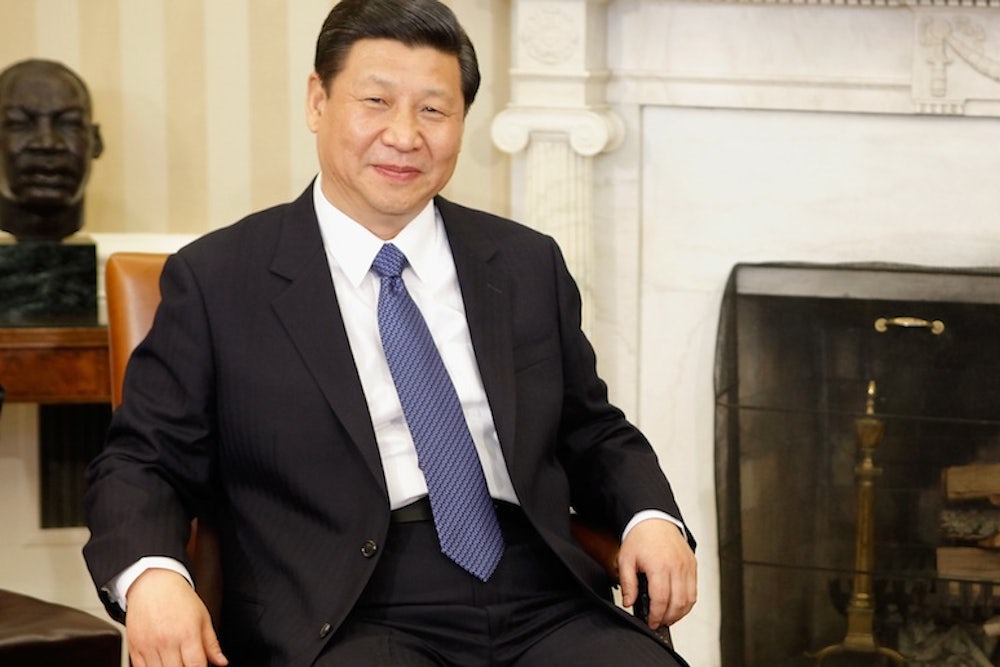In a creeping sign that Politico-ish news coverage has migrated to the international pages, The New York Times ran several articles over the past week about how the government shutdown, which resulted in President Obama cancelling his trip to Asia, marked a big victory for China. The premise of these pieces is that the United States and China are in some sort of competition for prestige and allies in Asia, and that each step backward by America means a step forward for China. Let's grant that this somewhat simplistic analysis has a grain of truth to it. But the pieces still exhibit two giant, flawed assumptions. The first is that international relations is some sort of horserace, and the other is that a leader's presence at a summit ranks with economics and politics as a driver of behavior.
Things kicked off on Saturday when Jane Perlez wrote a story about the "doubts" of American allies in Asia. A sampling from the piece:
As President Obama made apologetic calls to Asia to cancel his planned trip to the region, China’s leader, Xi Jinping, was taking a star turn in some of the same countries Mr. Obama would have visited...With the cancellation of the visits, the much-promoted but already anemic American “pivot” to Asia was further undercut, leaving regional allies increasingly doubtful the United States will be a viable counterbalance to a rising China...That wariness, Asian officials and analysts say, is giving China a new edge in the tug of war with the United States over influence in Asia, with the gravitational pull of China’s economy increasingly difficult to resist. “How can the United States be a reliable partner when President Obama can’t get his own house in order?” asked Richard Heydarian, a foreign policy adviser to the Philippine Congress and a lecturer in international affairs at Ateneo de Manila University in Manila.
The last question, presumably asked with seriousness by Mr. Heydarian, gives whole new meaning to the term "non sequitur." Perlez continues:
By failing to show up at the Asia-Pacific Economic Cooperation meeting, which opens on the Indonesian island of Bali on Monday, and by not attending the East Asia Summit in Brunei two days later, Mr. Obama could be ceding Mr. Xi plenty of ground...If showing up is more than half the game, some Asians say, Mr. Xi’s presence will highlight Mr. Obama’s absence.
Is showing up half the game? Do countries determine their foreign policy by who shows up at summits? No answers here, but the use of "game" is telling.
Perlez followed up with a piece on Tuesday about Obama's absence, which, the headline stated, left China the "dominant force" at the summit. Here is Perlez's account:
Mr. Obama’s absence was particularly damaging to American interests here in Indonesia, where the growing economy has been bolstered by a stronger Chinese presence that until a few years ago was resisted, said John Kurtz, the head of the Asia Pacific region for A. T. Kearney, a global management consulting firm. Mr. Xi visited Indonesia last week and announced that China would open a $50 billion infrastructure bank to service the region. “Indonesia’s ethnic Chinese business giants have drawn closer to China and have benefited greatly with that,” said Mr. Kurtz, an American who lives in Jakarta. “They have begun to reshape the views of the government.”
You'll notice that she completely fails to provide any evidence for the first sentence, merely going on to site a bunch of hard facts about Asian relations that would be true whether or not Obama made the trip. She continues, tellingly, with this:
Indeed some prominent Indonesians had joked after Mr. Obama decided not to attend that the United States was “playing checkers while the Chinese play chess,” he said.
So we are back to international relations as a game. Meanwhile, the paper ran an editorial on Tuesday expressing grave concern:
In Mr. Obama’s absence, China was able to grab the spotlight. China’s leader, Xi Jinping, who became the first foreigner to address the Indonesian Parliament, offered billions of dollars in trade to that country. Mr. Xi then visited Malaysia (another stop President Obama had planned) and announced a “comprehensive strategic partnership,” including an upgrade in military ties. Mr. Obama should reschedule his trip as soon as he comfortably can.
The fiscal chaos has also given China, America’s largest creditor, an opportunity to scold the United States. On Monday, in the Chinese government’s first public response to the stalemate in Washington, Vice Finance Minister Zhu Guangyao urged the United States to “earnestly take steps” to avoid a debt default to ensure the safety of Chinese investments and the global economic recovery.
Horrors. Is Chinese trade with Indonesia some secretive plot to undermine the United States?! Is it a brilliant move in the game of nations?! I eagerly await Obama's return of serve.
